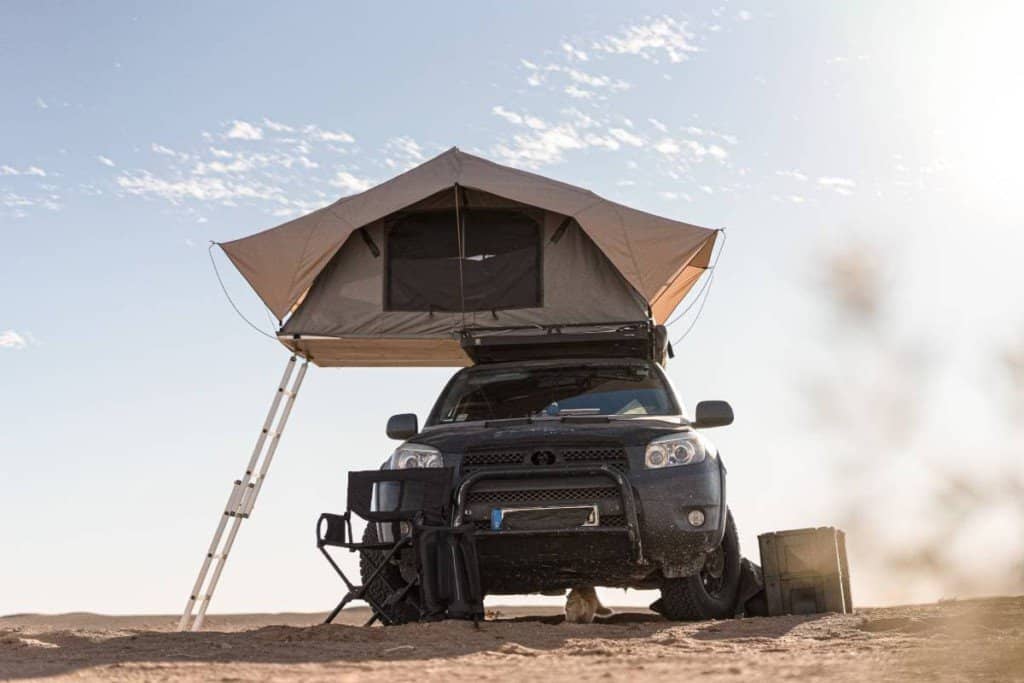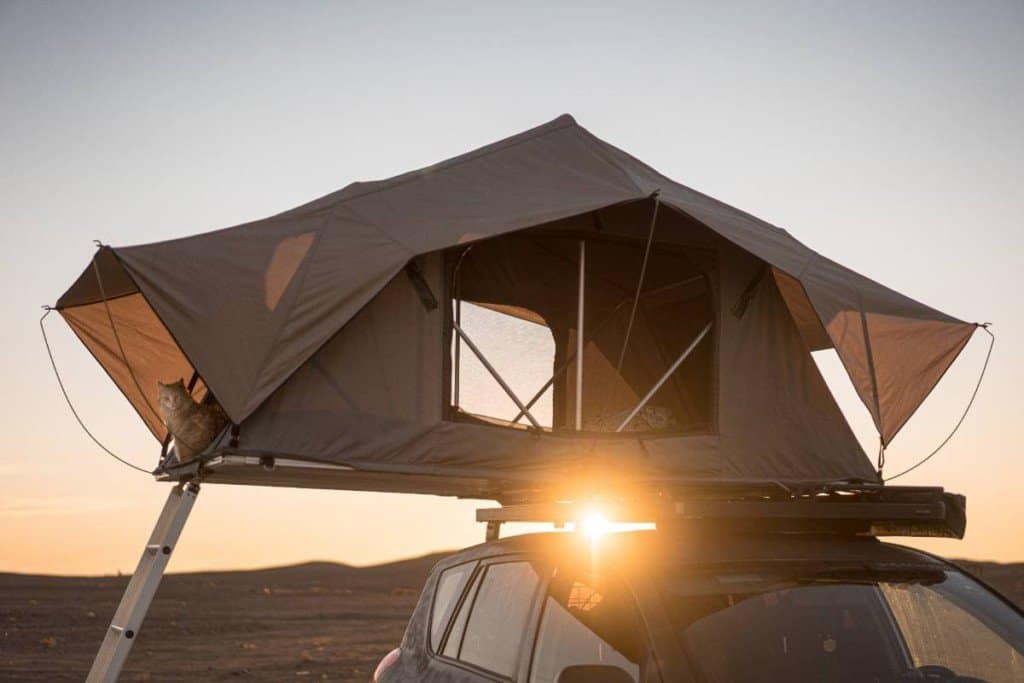Rooftop tents have become increasingly popular in recent years because of their practicality, convenience, and ease of use. However, there is a growing misconception that rooftop tents are only made for large vehicles like SUVs and vans, which is likely fueled by advertising campaigns that only use such automobiles.
A rooftop tent will fit your car if its weight doesn’t exceed the load-carrying capacity of your roof rack. Furthermore, the rooftop tent’s measurements shouldn’t exceed the length and width of your car’s roof.
Below I will explain how the weight and measurements of the rooftop tent determine whether it fits on your car. I also look at the potential risk of a rooftop tent damaging your vehicle.

Factors Affecting Rooftop Tent Installation
To enjoy the benefits of a rooftop tent without apprehension, you must ensure that the rooftop tent is mounted securely on your vehicle. If the rooftop tent doesn’t fit as the manufacturer intended, you risk your and the car’s safety.
Rooftop Tent Shouldn’t Exceed the Weight Limit
The rooftop tent’s weight is the primary concern when deciding whether it’ll fit on your vehicle.
Most people wrongly conclude their vehicle can hold a rooftop tent because they consider the wrong weight capacity. When choosing a rooftop tent, you should consider your roof rack’s weight capacity.
When the car is static, the entire weight of the vehicle, including the rooftop tent, is distributed throughout the vehicle. Therefore, when stationary, the car will handle the tent’s plus the occupants’ weight with minimal fuss. When stationary, the vehicle’s maximum weight capacity is referred to as static weight capacity (SWC).
However, the weight distribution on a moving car is different. With the vehicle in motion, it’s up to the roof rack to handle the rooftop tent’s weight. The roof racks’ maximum weight capacity is known as dynamic weight capacity (DWC).
The dynamic weight capacity can be five or six times less than the static weight capacity. Thankfully, you don’t have to whip out your calculator to determine the DWC: roof rack manufacturers provide that information in user manuals.
A rooftop tent suits your vehicle if its weight is lower than or similar to the roof rack’s dynamic weight capacity. Therefore, if the DWC is 150 lbs (68 kg), the rooftop tent should weigh 150 lbs (68 kg) or lower.

To guarantee your safety, choose a rooftop tent that doesn’t weigh too close to the rack’s DWC. For instance, if the DWC is 150 lbs (68 kg), don’t purchase a tent that’s 148 lbs (67.1 kg).
Endeavor to keep the top tent as light as possible during motion. Store as little as possible in the tent to reduce the stress on the roof rack.
You are unlikely to exceed your vehicle’s SWC, but consider checking it on the car’s manual, especially if you have a lot of equipment or several people using one tent.
Rooftop Tent Shouldn’t Exceed the Car’s Measurements
After ensuring the rooftop tent’s weight doesn’t exceed the DWC, check whether the tent fits your car’s dimensions. This is rarely a problem with SUVs and vans but can be an issue with smaller vehicles.
Choose a rooftop tent smaller than your roof’s length and width. It can also have similar dimensions or be slightly bigger than your car’s roof.
If you have a small vehicle, it might be challenging to find a rooftop tent that fits snuggly on your roof. In such a situation, you can purchase a rooftop tent extending slightly beyond the vehicle’s dimensions.
However, the extension beyond the roof shouldn’t be too extreme. For instance, the rooftop tent’s length shouldn’t exceed the car’s length.
I’ve also written another article about the best roof top tents for small cars, feel free to read more if you’re interested!
Will a Rooftop Tent Damage a Car?
Now that you’ve learned how to pick a rooftop tent that fits your vehicle, it’s only natural for you to worry about any potential damage to your car.
A rooftop tent will not damage your car if you adhere to both the roof rack and the car’s weight limit. Moreover, ensure that you install the rooftop tent according to the manufacturer’s instructions.
First, you must ensure the rooftop tents’ weight falls below the roof rack’s DWC, especially if you use the factory-installed roof rack. Factory-installed roof bars are notoriously flimsy: they crumble without hesitation when tasked with carrying excess weight.
Furthermore, they have a low carrying capacity. I recommend purchasing quality third-party roof racks that are sturdier and carry more weight.
Before I carry on, I’d like to address a misconception claiming rooftop tents are too expensive. To dispel that falsehood, I have compiled a list of the best rooftop tents to purchase with a budget of $900 and above. With that out of the way, let’s get back to this piece’s topic.
You should also consider the vehicle’s static weight capacity. You risk wearing out the car’s suspension faster if you overload the vehicle.
A poorly installed rooftop tent, even of the right weight, can damage the vehicle. Follow the manufacturer’s instructions to ensure you correctly set up and secure the rooftop tent on the right crossbars. This YouTube video by 4WD Supacentre shows how to install a rooftop tent:
If you opt to use a third-party roof rack, purchase one compatible with your vehicle.
The Effects on Stability and Consumption Are Negligible
You’ve likely come across publications stating that carrying a rooftop tent affects a car’s stability and consumption. The extra weight on top raises the car’s center of gravity, making it less stable, and increases consumption as the engine has to work harder.
There’s truth to the above claim, but you are unlikely to notice the changes to the car’s consumption and stability. You and your vehicle are safe if the rooftop tent’s weight remains below the rack’s DWC.
Conclusion
The perfect rooftop tent for your vehicle doesn’t exceed the weight-carrying capacity of your roof rack. Furthermore, it fits within the dimensions of your vehicle’s roof.
A properly mounted rooftop tent weighing below the roof rack’s DWC won’t damage your car.
